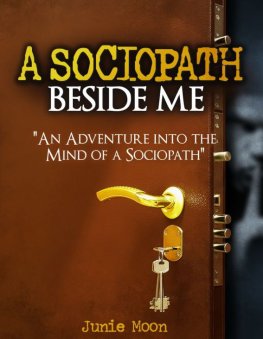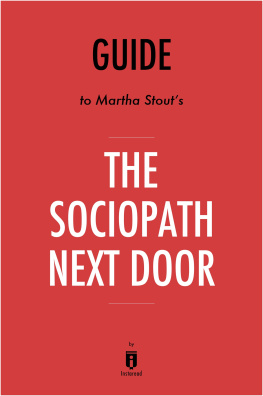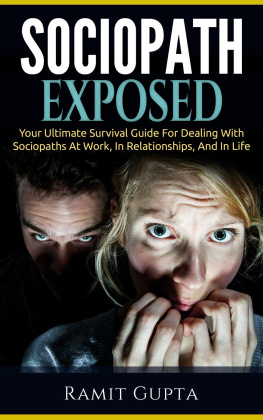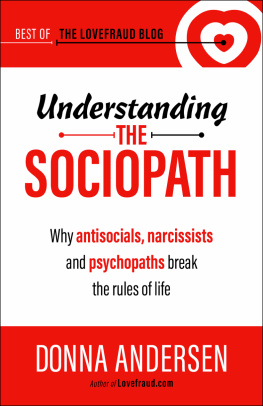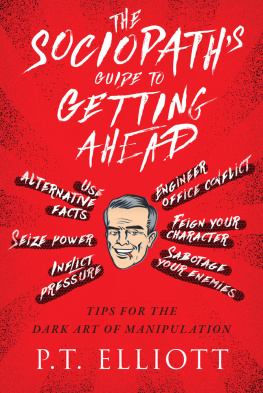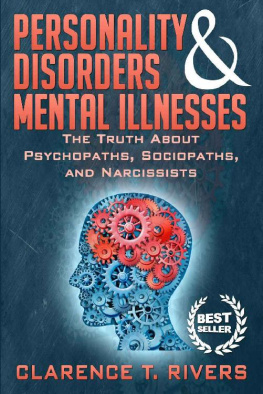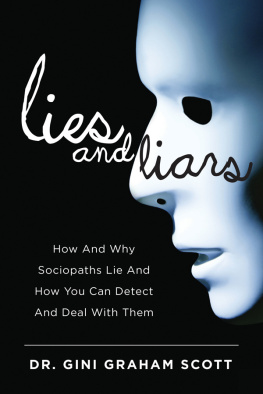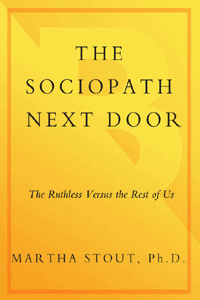The conscience of a people is their power.
acknowledgments
Much of the time, the absorbing task of writing a book feels less like authoring and more like channeling, through your fingers and a keyboard, the lessons and inspiration of countless other people, wise friends known over many years and teachers disguised as students, patients, and colleagues. I wish I could go back in time and thank them all, and I take delight in this chance to thank the people who most helped and supported me during the year I wrote The Sociopath Next Door.
For her commentary and utter indispensability, and her patience, I thank my friend and colleague Carol Kauffman, she of the legendary creativity at solving problems, whose generosity never skipped a beat, even though she was in the middle of writing Pivot Points.
Because none of this would have been possible without her moving commitment to her mission, and for her having been always a deep well of grace, comprehension, and heart in a wide desert, I thank my agent and treasured friend, Susan Lee Cohen.
If I had attempted to design the world's most superb editor, I could not have done nearly so well as Kristine Puopolo at Broadway Books, and I thank her for her intelligence, her precision, and her extraordinary ability to be quietly right, always, without ever being intrusive.
I thank Diane Wemyss for her caring and her organizing, and for having suggested one of the events I write about, and Elizabeth Haymaker for her charm across the miles.
I thank Steve Stout and Darcy Wakefield, for making me believe in love again.
Once againand alwaysI thank my remarkable parents, Eva Deaton Stout and Adrian Phillip Stout, for showing me just how much love and light two people of surpassing conscience can bring to the world.
And with awe, and more love than I could have imagined before I knew her, I would like to thank my daughter, Amanda, my first reader and my most insightful one. She has taught me, among so many other things, that kindness and integrity come with the soul.
The_Sociopath_Next_Door
author's note
The descriptions in The Sociopath Next Door do not identify individuals. At the very heart of psychotherapy is the precept of confidentiality, and as usual I have taken the most exacting measures to preserve the privacy of all real persons. All names are fictitious, and all other recognizable features have been changed. Some individuals who appear in the book willingly gave their consent to be anonymously portrayed. In these cases, no information has been included that might in any way identify them.
The story in the chapter entitled Groundhog Day is fiction. Otherwise, the people, events, and conversations presented here are taken from my twenty-five-year practice of psychology. However, because of my commitment to confidentiality, the people and circumstances portrayed in these pages are composite in nature; that is to say, each case represents a great many individuals whose characteristics and experiences have been adopted conceptually, carefully altered in their specifics, and combined to form an illustrative character. Any resemblance of such a composite character to any actual person is entirely coincidental.
The_Sociopath_Next_Door
INTRODUCTION
imagine
Minds differ still more than faces.
Voltaire
Imagineif you cannot having a conscience, none at all, no feelings of guilt or remorse no matter what you do, no limiting sense of concern for the well-being of strangers, friends, or even family members. Imagine no struggles with shame, not a single one in your whole life, no matter what kind of selfish, lazy, harmful, or immoral action you had taken. And pretend that the concept of responsibility is unknown to you, except as a burden others seem to accept without question, like gullible fools. Now add to this strange fantasy the ability to conceal from other people that your psychological makeup is radically different from theirs. Since everyone simply assumes that conscience is universal among human beings, hiding the fact that you are conscience-free is nearly effortless. You are not held back from any of your desires by guilt or shame, and you are never confronted by others for your cold-bloodedness. The ice water in your veins is so bizarre, so completely outside of their personal experience, that they seldom even guess at your condition.
In other words, you are completely free of internal restraints, and your unhampered liberty to do just as you please, with no pangs of conscience, is conveniently invisible to the world. You can do anything at all, and still your strange advantage over the majority of people, who are kept in line by their consciences, will most likely remain undiscovered.
How will you live your life? What will you do with your huge and secret advantage, and with the corresponding handicap of other people (conscience)? The answer will depend largely on just what your desires happen to be, because people are not all the same. Even the profoundly unscrupulous are not all the same. Some peoplewhether they have a conscience or notfavor the ease of inertia, while others are filled with dreams and wild ambitions. Some human beings are brilliant and talented, some are dull-witted, and most, conscience or not, are somewhere in between. There are violent people and nonviolent ones, individuals who are motivated by blood lust and those who have no such appetites.
Maybe you are someone who craves money and power, and though you have no vestige of conscience, you do have a magnificent IQ. You have the driving nature and the intellectual capacity to pursue tremendous wealth and influence, and you are in no way moved by the nagging voice of conscience that prevents other people from doing everything and anything they have to do to succeed. You choose business, politics, the law, banking, or international development, or any of a broad array of other power professions, and you pursue your career with a cold passion that tolerates none of the usual moral or legal incumbrances. When it is expedient, you doctor the accounting and shred the evidence, you stab your employees and your clients (or your constituency) in the back, marry for money, tell lethal premeditated lies to people who trust you, attempt to ruin colleagues who are powerful or eloquent, and simply steamroll over groups who are dependent and voiceless. And all of this you do with the exquisite freedom that results from having no conscience whatsoever.




